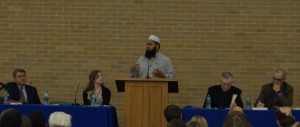
The Heaven and Hell Symposium packed the Garden Court in the Wilkinson Center on Thursday night, Oct. 15. Representatives from The Church of Jesus Christ of Latter-day Saints, the Islamic faith, the Catholic Church and the evangelical Christian faith were present to discuss their faiths’ respective views on heaven and hell.
Mormon and BYU teacher education professor Brad Wilcox discussed the motivation behind organizing this symposium. He and fellow professor Eula Monroe, who is a Baptist, helped organize the symposium and facilitate the Q&A session at the end of the event, which was sponsored by BYU’s CrossSeekers Christian Student Fellowship.
“Last year we hosted an interfaith symposium that discussed the gift of grace,” Wilcox said. “We had such a wonderful response that we decided to hold the event again.”
Wilcox said this event was an opportunity for the community to realize that people of all faiths and backgrounds can come together to discuss and learn from each other.
“This event isn’t just about bringing the speakers and the students together,” Wilcox said. “People from all the faiths represented tonight are in the audience. This is bringing everyone together, and it is opening doors for new understanding and new friendships.”
Wilcox said a strong interfaith relationship made the event possible.
“I am about as Mormon as you can be, and Eula Monroe is about as Baptist as you can be,” Wilcox said. “This event all started because the two of us formed an unlikely friendship based on respect.”
LDS perspective
Brent Top, dean of religious education at BYU, provided the Latter-day Saint perspective on heaven and hell.
The former mission president focused on the aspect of the afterlife unique to Mormonism: the spirit world. “The spirit world is life after death, but before the literal resurrection,” Top said.
He discussed the LDS doctrine that all spirit bodies were created from something called intelligence. “If we understand the human spirit in the pre-mortal life, we understand our eternal destiny,” he said.
Top said the Mormon belief is that heaven will be on this earth. “The scriptures teach that all eternal things are made in likeness to temporal things,” he said. “The spirit world is not far from us. It is a place of peace, glory and happiness for the righteous.”
Islamic perspective
Imam Shuaib-ud Din presented the Islamic perspective on the afterlife. The Imam said there are four stages of the soul, according to Islamic doctrine.
“The first stage was before we came to this world, when God asked all the souls present ‘Am I not your Lord?’” the Imam said. “All of the souls answered, ‘Yes, indeed you are our Lord.’”
He said the next three stages of the soul were in the mother’s womb, death, and the literal resurrection. The places the soul will go in the afterlife are not imaginary or metaphorical. “It is easy to forget the world of the unseen,” the Imam said. “But paradise and hell are very real places.”
The Islamic faith believes there will be four questions asked of individuals before they can enter paradise. “These questions are: What did you do with your life? Your wealth? Your knowledge? Your youth?” he said.
The Islamic doctrine mentions that at the doors of paradise, a book of good deeds will be placed in one’s right hand, and a book of bad deeds that will be placed in one’s left hand. “Your deeds will be weighed by large scales brought forth on the day of judgment,” he said. “Your good deeds should outweigh your bad deeds, and then it is decided that you will go to paradise.”
The Imam said works are not the only thing that allow us entrance into paradise. “The Prophet Mohammed taught that no one will enter paradise except through God’s mercy.”
Catholic perspective
Monsignor Mannion, a priest in the Catholic Dioceses of Salt Lake, spoke about heaven and hell from a Catholic viewpoint. “Heaven and hell in the Catholic tradition are not places, but they are conditions beyond space or time,” he said.
These conditions can occur in this life, as well as the next. “Catholics believe that heaven is a moral conversion that begins now, with baptism, when we are first united with Christ,” Monsignor Mannion said.
He compared the state of individuals in these conditions according to Catholic doctrine. He said Catholics believe hell is a result of individuals refusing to accept Christ. “We believe that hell is a place of bitter isolation and heaven is a loving community of saints,” Monsignor Mannion said.
The priest mentioned that many people fear the idea of heaven because they believe it will be boring. “Heaven is a place of contemplation, where saints will grow forever in God’s glory,” Monsignor Mannion said. “Heaven will not be boring.”
Evangelical perspective
Travis Kerns, who oversees Southern Baptist missionaries along the Wasatch Front, discussed the afterlife from the evangelical Christian perspective.
Kerns began his remarks by quoting a Protestant hymn titled “On Jordan’s Stormy Banks.” The verses offered detailed descriptions of both heaven and hell. “This hymn reinforces the truth that Christians, especially evangelical Christians, are enamored with the idea of heaven and hell,” Kerns said.
He relayed the evangelical belief regarding what happens in heaven. “The Bible says that heaven is the dwelling place of God, and everything that takes place there is directed towards his holiness,” he said.
Hell is also a very real place with real punishments in the evangelical tradition. “The hymns about hell are definitely less than beautiful,” he said. “Hell is pain, agony and gnashing of teeth.”
Kerns pointed out the scriptural teaching that by grace, through faith, all can get to heaven. “The how of getting to heaven or hell is the overarching meta-narrative of scripture,” Kerns said. “In spite of what we deserve, God showed his love by sending us a Messiah.”




